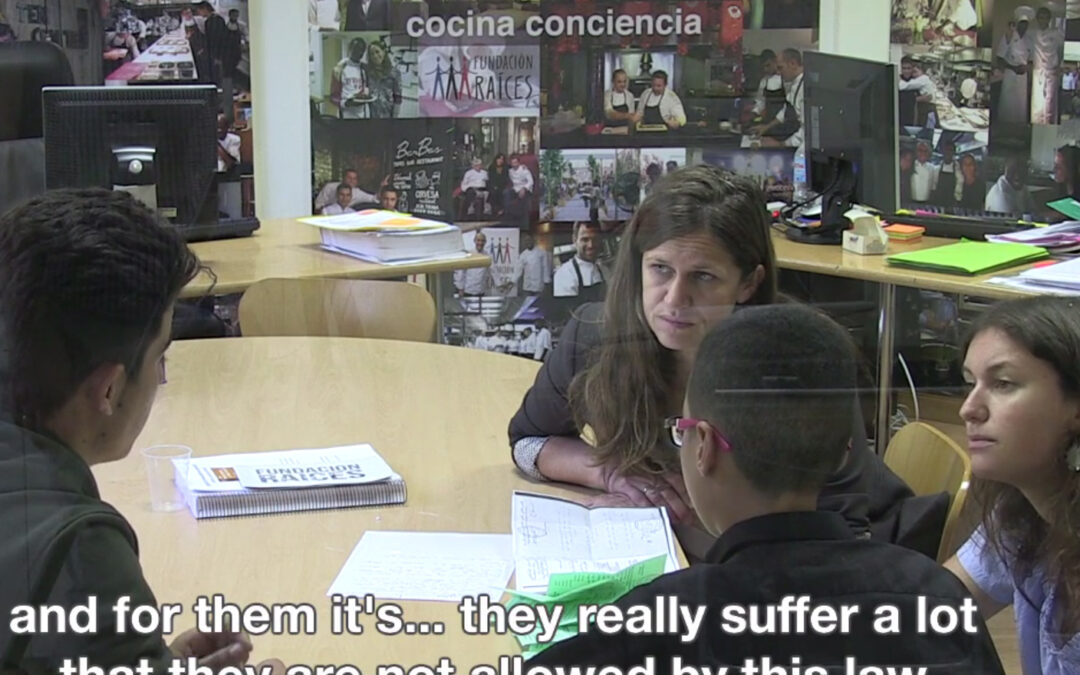
May 8, 2018 | Événements, Nouvelles
Entre 2016 et 2018, la CIJ – Institutions Européennes a travaillé avec des partenaires dans sept pays de l’Union Européenne (UE) sur l’accès à la justice pour les enfants migrants dans le cadre du projet FAIR (en français : favoriser l’accès au droit des enfants migrants).
Les enfants migrants au sein de l’UE font face à de multiples violations de leurs droits humains et ce quotidiennement.
Il souffrent notamment d’un manque d’accès à leurs familles, à l’information, à une assistance et protection juridique, à l’éducation et à un logement. Ils sont aussi victimes de détentions illégales.
Le but du projet était de renforcer l’accès à la justice pour les enfants migrants en créant une équipe d’avocats européens bien préparés pour les représenter au niveau national et international.
Durant le projet FAIR, la CIJ – Institutions Européennes a effectué les activités suivantes:
- Développé sept modules de formation sur l’accès à la justice pour les enfants migrants ;
- Formé 142 avocats de sept pays de l’UE: Espagne, Italie, Bulgarie, Malte, Grèce, Irlande et Allemagne ;
- Rassemblé 35 avocats et experts durant un séminaire sur le litige stratégique de cinq jours ;
- Créé un réseau international d’avocats ;
- Fourni un soutien au travail des avocats engagés pour les enfants migrants.
Le projet FAIR a été fondé conjointement par le Programme Droits, Égalité et Citoyenneté de l’UE et par l’OSIFE.
Voir la vidéo sur le projet FAIR
Voir la vidéo sur le séminaire consacré au litige stratégique
Le matériel de formation sera prochainement disponible en anglais, espagnol, grec, bulgare, italien et allemand.
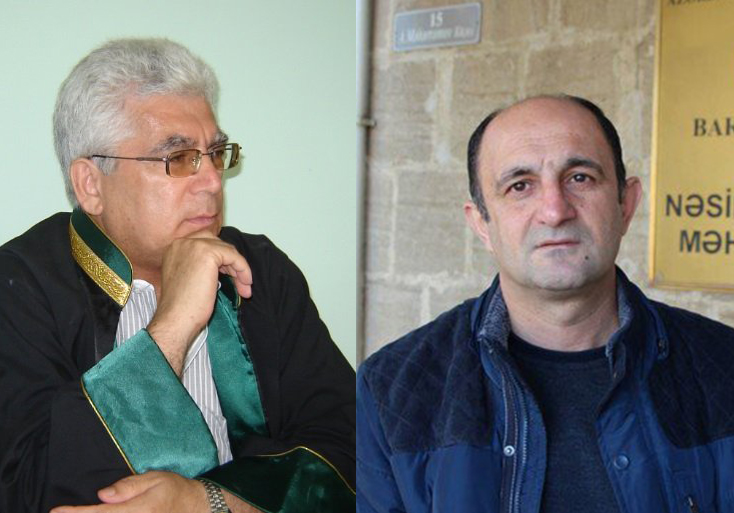
May 7, 2018 | News
The ICJ today denounced the decision of the Presidium of the Azerbaijan Bar Association, of 23 April 2018, to suspend the licences of two Azerbaijan human rights lawyers Asabali Mustafayev (photo, on the left) and Nemat Karimli (photo, on the right).
The ICJ called on the Presidium to reverse their decision and allow the lawyers to resume their practice.
It stressed that disciplinary proceedings pending against the lawyers should be immediately terminated.
The ICJ said that the decision of the Presidium was contrary to international standards on the role of lawyers including the right to freedom of expression as guaranteed under international law.
The ICJ understands that the proceedings against the two lawyers, initiated following a submission of the Deputy Prosecutor General, were related to the critical statements made by the lawyers in the media, regarding high profile criminal cases.
Nemat Karimli, had stated in media interviews that his client Afgan Mukhtarli, an opposition activist convicted on charges of smuggling, had been illegally and forcibly transferred from Georgia to Azerbaijan and that his life could be at risk if he was returned to Azerbaijan.
The lawyer also complained of excessive searches and being prevented from communicating in private while visiting his client in detention.
The disciplinary proceedings against Asabali Mustafayev relate to allegations he made on social media that the prosecution of politician Gozal Bayramli, on a charge of smuggling, was politically motivated.
Both lawyers were charged with spreading false statements and slanderous information about investigative authorities.
The submission of the Prosecutor to the Bar Association, on 25 October 2017, alleged that lawyers Nemat Karimli and Asabali Mustafayev in their interviews to the media had “politicized” the criminal cases of Bayramli and Mukhtarli, tried to mislead the public and slandered investigative authorities. According to the information provided by the lawyers, no evidence had been attached to this submission.
Instead, the Disciplinary Commission collected evidence to submit to the Presidium of the Bar Association, which subsequently suspended the licence of the lawyers.
Furthermore, the lawyers state that, contrary to what is required by the Law on Lawyers and Advocates Activities, they have not received a copy of the opinion of the Disciplinary Commission submitted to the Presidium of the Bar Association.
The ICJ is concerned that the suspension of the lawyers’ licences, for comments which drew attention to possible violations of human rights, may violate the lawyers’ right to freedom of expression.
These comments appear to be within the bounds of lawyers professional responsibility to protect their clients in every appropriate way (UN Basic Principles, principle 13(b)).
The right to freedom of expression is protected under international treaties to which Azerbaijan is a party, including by Article 19 of the International Covenant on Civil and Political Rights (ICCPR) and article 10 of the European Convention on Human Rights (ECHR).
The UN Basic Principles on the Role of Lawyers specify that lawyers “…have the right to take part in public discussion of matters concerning the law, the administration of justice and the promotion and protection of human rights …”.
The European Court of Human Rights has emphasized that lawyers are entitled to comment in public on the administration of justice, provided that their criticism does not overstep certain bounds, based on principles of dignity, honor, integrity, and respect for the fair administration of justice.
The ICJ emphasizes that protection of lawyers’ freedom of expression, in particular as regards issues of the rule of law and the administration of justice, is not only important to the individuals in question, it also serves as an important safeguard for the protection of human rights.
Where lawyers are subject to disciplinary sanctions for such statements, the role of lawyers in upholding the rule of law in the administration of justice is undermined.
The ICJ therefore calls on the Azerbaijan Bar Association to lift the disciplinary sanctions that would unjustifiably interfere with lawyers’ freedom of expression.
The ICJ also calls on the Azerbaijan Bar Association to ensure that the lawyers subject to disciplinary proceedings obtain a copy of the opinion to be able to prepare their arguments and defence.
Background
Asabali Mustafayev represented Gozal Bayramli who was found guilty and sentenced to three years in prison for smuggling €12,000 ($13,400) in cash. Mustafayev had expressed his opinion about the arrest of Gozal Bayramli in his social media profile, alleging that it was politically motivated. He stated that when he shared this opinion he was not yet engaged as Gozal Bayramli’s lawyer.
Nemat Karimli represented Afgan Mukhtarli, an opposition activist based in Tbilisi, who was convicted of smuggling € 10,000, illegally crossing the border and resisting police arrest and was sentenced to six years in prison. Karimli in an interview stated that Mukhtarli was taken to Azerbaijan illegally and called on the Georgian authorities not to hand him to Azerbaijan authorities since it might endanger Mukhtarli’s life.
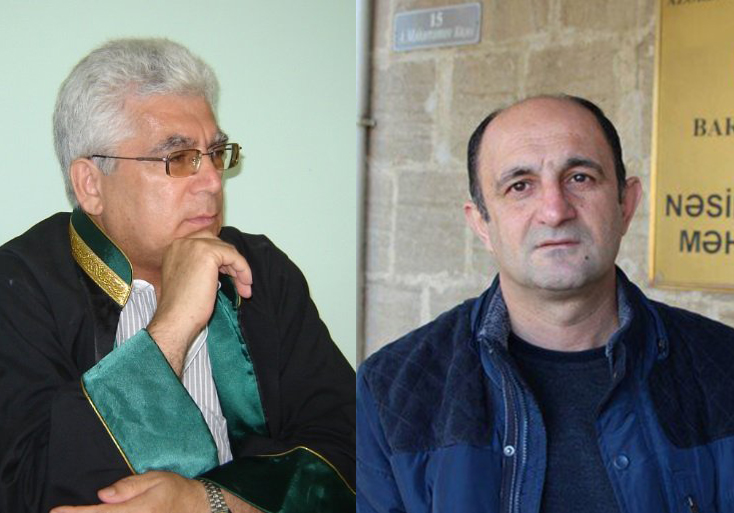
May 7, 2018 | Новости, Статьи
Сегодня МКЮ осудила решение Президиума Ассоциации Адвокатов Азербайджана 23 апреля 2018 года о приостановлении лицензий двух азербайджанских адвокатов по правам человека, Асабали Мустафаеву (фото, слева) и Немату Каримли (фото, справа).
МКЮ призвала Президиуму отменить свое решение и позволить адвокатам возобновить свою практику.
Она подчеркнула, что дисциплинарное разбирательство в отношении адвокатов должно быть немедленно прекращено.
МКЮ сказала, что решение Президиума противоречит международным стандартам в отношении роли юристов, включая право на свободу выражения, гарантированное международным правом.
МКЮ понимает, что судебное разбирательство в отношении двух адвокатов, инициированное по представлению заместителя Генерального прокурора, связано с критическими заявлениями адвокатов в СМИ в отношении высокопоставленных уголовных дел.
Немат Керимли заявил в интервью СМИ, что его клиент Афган Мухтарли, активист оппозиции, осужденный по обвинению в контрабанде, был незаконно и насильственно переведен из Грузии в Азербайджан и что его жизнь может оказаться под угрозой, если он будет возвращен в Азербайджан.
Адвокат также жаловался на чрезмерные обыски и был лишен возможности общаться наедине при посещении его клиента в заключении.
Дисциплинарное разбирательство против Асабали Мустафаева связано с утверждениями, которые он сделал в социальных сетях, о том, что обвинение политика Гозала Байрамлы в контрабанде было политически мотивировано.
Оба адвоката обвинялись в распространении ложных заявлений и клеветнической информации о следственных органах.
Представление прокурора Ассоциации адвокатов 25 октября 2017 года утверждало, что адвокаты Немат Керимли и Асабали Мустафаев в своих интервью СМИ «политизировали» уголовные дела Байрамлы и Мухтарли, пытались ввести в заблуждение публику и оклеветали следственные органы. Согласно информации, предоставленной адвокатами, к этому представлению не было представлено никаких доказательств.
Вместо этого Дисциплинарная комиссия собрала доказательства для представления Президиуму Ассоциации адвокатов, который впоследствии приостановил действие лицензии адвокатов.
Кроме того, адвокаты заявляют, что, вопреки требованиям Закона о адвокатуре и адвокатской деятельности, они не получили копии мнения Дисциплинарной комиссии, представленной в Президиум Ассоциации адвокатов.
МКЮ обеспокоена тем, что приостановление действия лицензий адвокатов, из-за комментариев, которые привлекли внимание к возможным нарушениям прав человека, может нарушить право адвокатов на свободу выражения.
Эти комментарии, как представляется, входят в рамки профессиональной ответственности юристов за защиту своих клиентов всеми возможными способами (Основные принципы ООН, принцип 13 (b)).
Право на свободу выражения мнения защищено в соответствии с международными договорами, участником которых является Азербайджан, в том числе статьей 19 Международного пакта о гражданских и политических правах (МПГПП) и статьей 10 Европейской конвенции о защите прав человека (ЕКПЧ).
В Основных принципах ООН по роли юристов указывается, что юристы «… имеют право участвовать в публичном обсуждении вопросов, касающихся права, отправления правосудия и поощрения и защиты прав человека …».
Европейский суд по правам человека подчеркнул, что адвокаты имеют право публично комментировать о судебном разбирательстве при условии, что их критика не превзойдет определенные рамки, основанные на принципах достоинства, чести, добросовестности и уважения справедливого отправления правосудия.
МКЮ подчеркивает, что защита свободы слова адвокатов, в частности в вопросах верховенства закона и отправления правосудия, не только важна для отдельных лиц, но и служит важной гарантией защиты прав человека.
В тех случаях, когда адвокаты подвергаются дисциплинарным санкциям за такие заявления, роль юристов в обеспечении верховенства закона в отправлении правосудия подорвана.
В связи с этим МКЮ призывает Ассоциацию адвокатов Азербайджана отменить дисциплинарные санкции, которые необоснованно вмешиваются в свободу слова адвокатов.
МКЮ также призывает Ассоциацию адвокатов Азербайджана обеспечить, чтобы адвокаты, подлежащие дисциплинарному разбирательству, получили копию мнения, чтобы иметь возможность подготовить аргументы и защиту.
Дополнительная Информация
Асабали Мустафаев представлял Гозала Байрамлы, который был признан виновным и приговорен к трем годам тюремного заключения за контрабанду в размере 12 000 евро (13 400 долларов) наличными. Мустафаев высказал свое мнение об аресте Гозала Байрамли в своем профиле в социальных сетях, утверждая, что он политически мотивирован. Он заявил, что, когда он высказал это мнение, он еще не участвовал в качестве адвоката Гозала Байрамли.
Немат Керимли представлял Афгана Мухтарли, активист оппозиции из Тбилиси, который был осужден за контрабанду в размере 10 000 евро, незаконно пересек границу и сопротивлялся аресту полиции и был приговорен к шести годам лишения свободы. Каримли в интервью заявил, что Мухтарли был незаконно доставлен в Азербайджан и призвал власти Грузии не передавать его властям Азербайджана, поскольку это может поставить под угрозу жизнь Мухтарли.
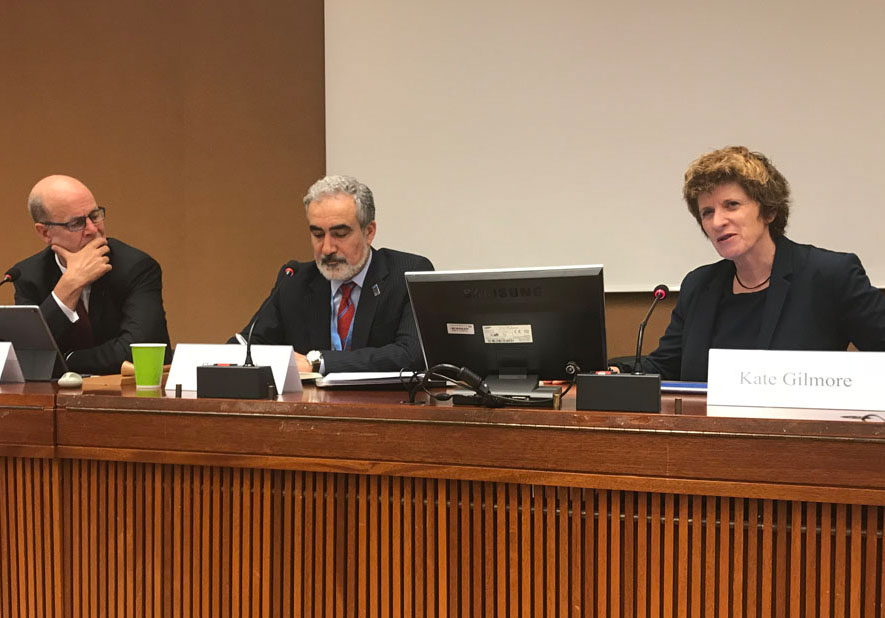
May 3, 2018 | Feature articles, News
On 3 and 4 May 2018, the ICJ supported by UNAIDS and OHCHR convened an expert meeting on global principles addressing criminalization’s detrimental impact in the areas of sexuality, reproduction, drug use and HIV.
The expert meeting of leading jurists from around the globe aimed at laying the foundations for a set of principles to address the misuse and abuse of the criminal law and its detrimental impact on health, equality and human rights.
The expert group focused on the criminalization of conduct relating to four principal areas: sexuality, reproduction, personal drug use, and the overly broad criminalization of HIV exposure, transmission and non-disclosure.
In these areas, international human rights authorities, as well as domestic courts, have regularly found criminal law provisions to be contrary to international law and standards, and to have a deleterious effect on public health.
“We need to understand why the blunt instrument of the criminal law is used against and affects real people, and why the criminal law ought not to apply in our four areas of concern. Where the criminal law is misused, that is a betrayal of the rule of law. The rule of law must be our guiding compass,” said Justice Cameron, Constitutional Court of South Africa.
“The principles we hope to develop must facilitate the availability of tools which can impact key populations where they are in conflict with the law. They are often at risk of blackmail, stigma and discrimination. It falls on courts to make the difficult decisions. Judges can then consider legality, legitimate purpose and questions of necessity and proportionality in light of a broader understanding of the human rights principles at stake and the relevant scientific evidence,” said Judge Mbaru, Industrial Court of Kenya.
“The law is required to guarantee rights but at same time it can impose arbitrary restrictions. Often those restrictions in the form of the criminal law purport to be necessary in order to ‘protect’ people. That purported purpose ought to be closely scrutinised,” said Justice Ortiz, Constitutional Court of Columbia.
Sam Zarifi, Secretary General of the ICJ, stated: “The misuse of the criminal law affects the most marginalized groups of people and, in particular, the dispossessed and disenfranchised.”
“The centrality of the rule of law at a time when it is under threat globally, and our crucial obligation to stand against laws that are arbitrary, unequal and discriminatory,” he added.
Tim Martineau, Acting Deputy Executive Director of UNAIDS said: “The application of human rights principles to criminal law is key in order to address the detrimental impact of such laws in the areas of sexuality, reproduction, drug use and HIV.”
“While there was significant progress in HIV prevention, treatment and care, there was a big discrepancy in HIV prevention in relation to key populations who are more vulnerable to HIV infection in many respects because of a lack of legal protection, and the unjust criminalization of their behaviour,” he added.
Kate Gilmore, Deputy High Commissioner for Human Rights, stated that the criminal law can readily become a tool of repression or oppression. She said: “Wrongful deployment of criminal law betrays universal human rights standards. By eroding rather than protecting physical and mental integrity specifically in the contexts of sexuality, reproduction and gender identity, misuse of criminal law seeks a wrongful “regulation” of the body of women in particular, with devastating consequences for women’s and girls’ autonomy, health and well being.”
She emphasized that “the criminal law plays an essential role in the recognition, protection and enforcement of rights including by tackling impunity for violations for those rights.”
ICJ, UNAIDS and OHCHR consider that the envisaged principles will help legislators, judges and advocates in the development and review of criminal laws that have adverse consequences on health, equality and human rights particularly where they relate to key populations.
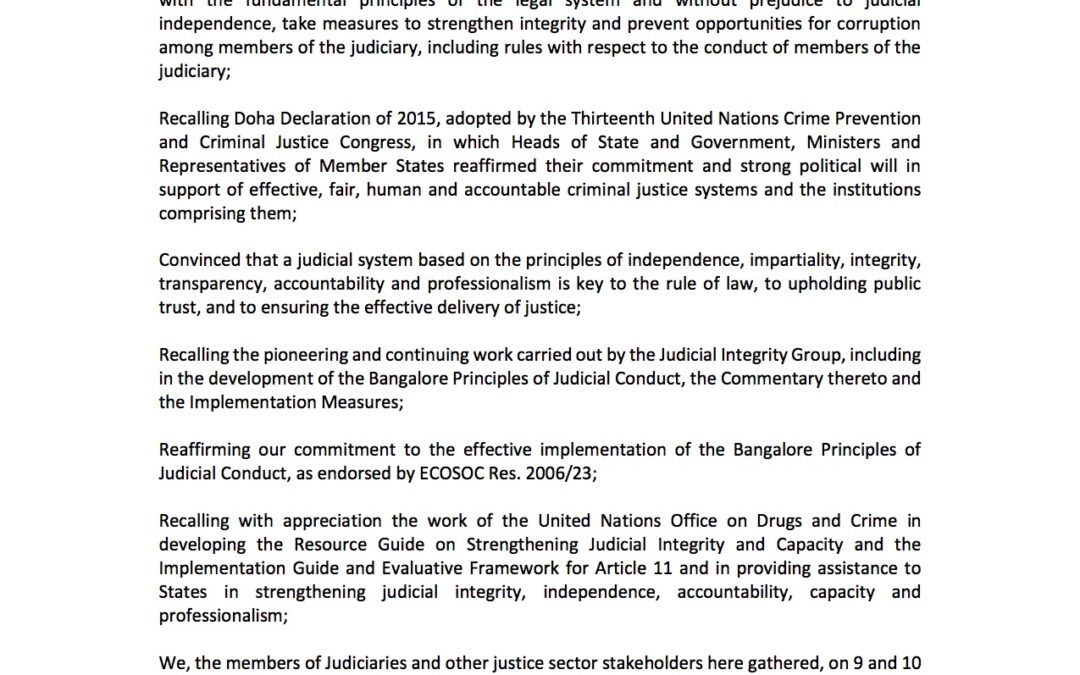
May 3, 2018 | News
The UN Office on Drugs and Crime (UNODC) today published a Declaration on Judicial Integrity, adopted by Chief Justices and other judges and stakeholders at the launch of a new Global Judicial Integrity Network in Vienna.
ICJ actively participated in the launch event, which took place 9-10 April at the UN offices in Vienna, Austria. It was one of the largest-ever gatherings of Chief Justices and other senior judges, together with other experts and stakeholders.
In addition to organising a panel discussion on judicial selection and appointment procedures in Southern and East Africa, the ICJ made the following statement to the plenary session of the launch event:
Throughout the decades since its inception in 1952, the primary and most effective means by which the International Commission of Jurists has worked to promote the rule of law around the world is precisely by bringing judges from different countries together to share experience and expertise with one another, and together to seek solutions to the common challenges they face. The Judicial Integrity Network should make a huge contribution by creating a platform for this kind of judge-to-judge engagement to take place on a global scale and a continuous basis. The sessions today and yesterday have truly illustrated the very great potential of the Network. The ICJ strongly supports the efforts of UNODC, Chief Justices, and other stakeholders to bring the Network into being, and we look forward to participating in it, promoting it, and using it in our own work with judiciaries around the world, in the years ahead.
The plenary session also accepted, by consensus, the ICJ’s proposal to include key language from the UN Basic Principles on the Independence of the Judiciary, in the Declaration.
The Declaration, Terms of Reference, and Participants List is available on the UNODC website here or can be downloaded from the following links:
Declaration on Judicial Integrity (UNODC event 2018)
UNODC GJIN Terms of Reference 2018
ICJ Practitioners Guide no 13, on Judicial Accountability, can be downloaded here: Universal-PG 13 Judicial Accountability-Publications-Reports-Practitioners Guide-2016-ENG









